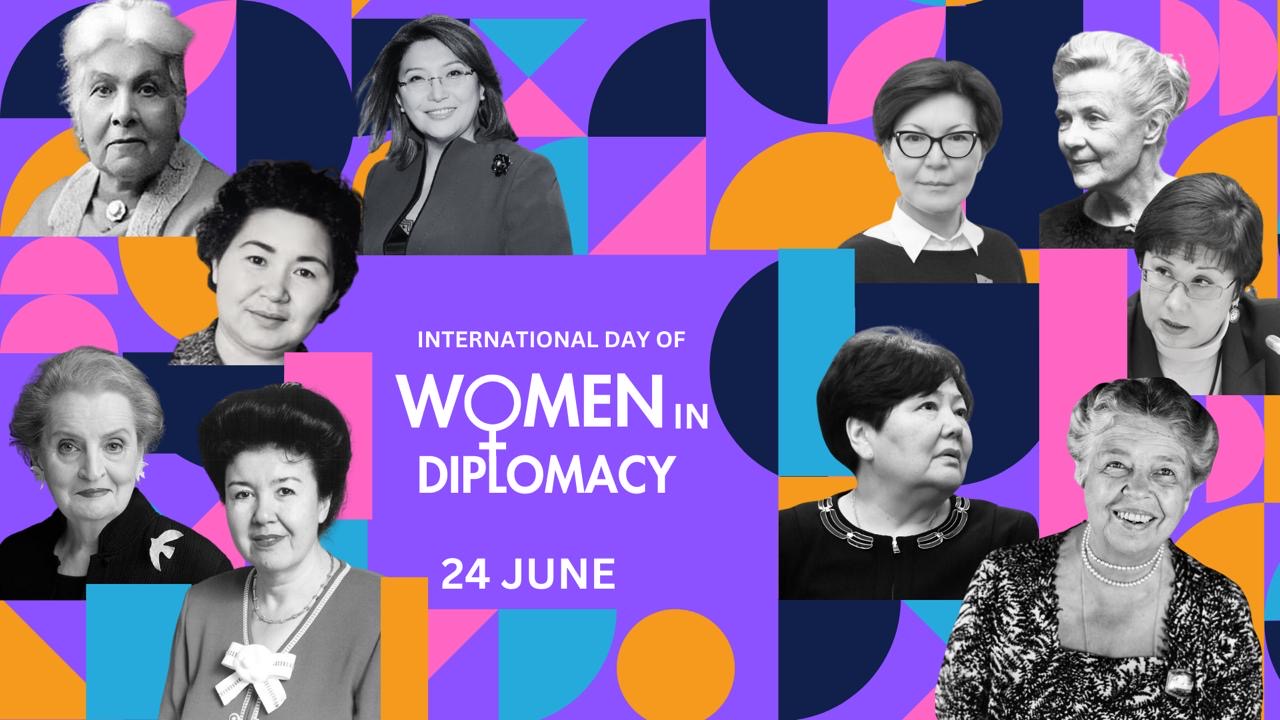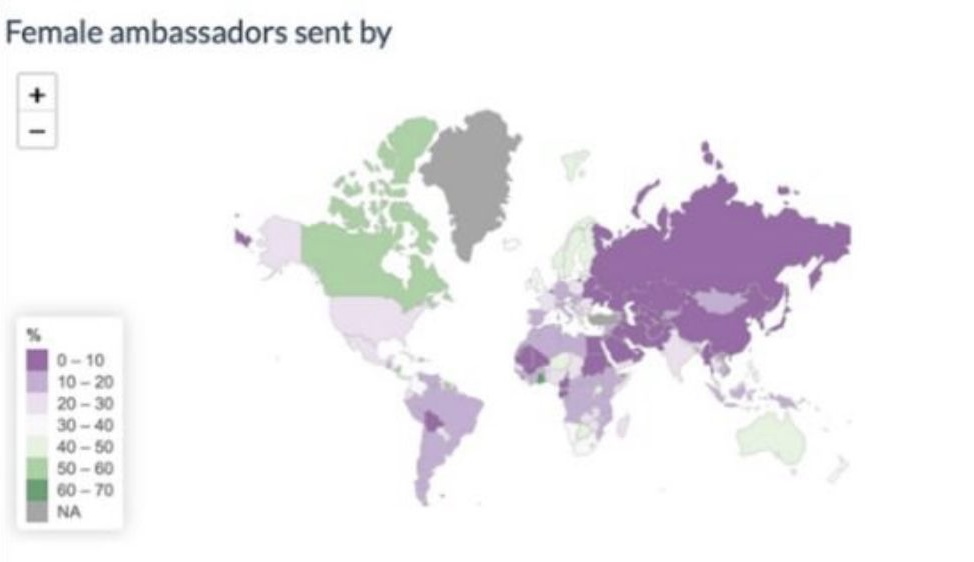On June 24, since 2022, we commemorate the International Day of Women in Diplomacy, an initiative by the United Nations General Assembly. This day aims to make women’s leadership more visible, acknowledge the achievements of women in the diplomatic sphere, and highlight the journey still required to achieve full and equal participation of women in all areas of decision-making and political life.

Photo credit: UN in Kazakhstan.
Historical Representation of Women in Diplomacy
The establishment of the International Day of Women in Diplomacy by the United Nations General Assembly on June 24 reflects the ongoing efforts to address the underrepresentation of women in diplomacy. This day serves as a reminder of the strides made and the challenges that remain in ensuring gender parity in diplomatic roles worldwide.
Historically, the representation of women in diplomacy has been minimal. For centuries, women were banned from public offices such as diplomats. Since the early 1920s the legal barriers limiting women’s choices started to be lifted. However, the social norms and prejudice have remained far longer and only four of the 850 delegates who signed the Charter of the United Nations in 1945 were women. Since then, there has been an increase in women’s representation in bilateral diplomacy and at the United Nations, but progress has been slow. International decision-making spaces often lack women’s presence and structural barriers remain. That is why the recent election of the Kazakh distinguished Ambassador H.E Madina Jarbussynova, as the first woman from Central Asia to be elected in members of the Committee on the Elimination of All Forms of Discrimination against Women (CEDAW) for 2025-2028 marks another milestone for Kazakh women in global diplomacy.
One of the United Nations’ greatest achievements was the adoption of the Universal Declaration of Human Rights in 1948, spearheaded by a woman – Ms Eleanor Roosevelt. The Universal Declaration of Human Rights recognized the equal rights of men and women as fundamental human rights and women’s engagement in peace processes in Liberia and Ireland are just two examples of women’s fundamental roles in achieving durable success.
Despite this, diplomacy remains predominantly male-dominated, with women serving as Heads of State and Government in only 28 countries. With the recent election of Ms Claudia Sheinbaum as Mexico’s first woman president, the number will soon be 29. At the ministerial level, women hold just some 25% of foreign affairs portfolios. In Kazakhstan, the first female Foreign Minister was appointed already in 1966 when Ms Balzhan Bultrikova was appointed as Foreign Minister of the Kazakh SSR. Later, from 1989 to 1991, Ambassador Akmaral Arystanbekova also served as Foreign Minister of the Kazakh SSR. Since then no women has held the position of a foreign minister of Kazakhstan. Today, the republic has a female Vice-Minister of Foreign Affairs Ms Nazira Nurbayeva and a large proportion of female staff within the ministry. Although in some countries, women have actually dominated the position of a foreign minister. For example, since 1994 in South Africa, all but one of the foreign ministers have been women. This is a unique global standing.
Kazakhstan’s Progress in Gender Equality
It is noteworthy that Kazakhstan has a far higher percentage, than many other countries, of women in the group of distinguished diplomats who have held the office of Permanent Representative to the United Nations. Kazakhstan’s first Permanent Representative to the United Nations was Ambassador Akmaral Arystanbekova, who was the fourth female ambassador among the 176 member states of the United Nations. Ambassador Arystanbekova who held the position for over seven years, was succeeded by Ambassador Madina Jarbussynova (1999-2003) – now a member of the CEDAW. A few years later, Kazakhstan appointed another distinguished female diplomat to this strategic post, Ambassador Byrganym Aitimova (2010-2013). This means that since Kazakhstan joined the United Nations in 1992, the country has been represented by a female ambassador for the majority of its membership – a total of 17 years out of 32 years. This is a unique global achievement in gender balanced representation in this prominent diplomatic position.
Given the important role that Kazakhstan plays today on the international multilateral scene, and its significant contribution to peace and security, it should be recognised that Kazakhstan’s female diplomats have been instrumental in making this happen.
Gender Parity in the United Nations
The United Nations itself has struggled with gender parity. However, significant progress has been made under the leadership of the Secretary-General over the past six years. In 2020, gender parity was achieved among senior leaders of the United Nations. The organization is on track to achieve parity at all levels at Headquarters within the next five years. Nevertheless, we are yet to see a female Secretary General of the United Nations and women are still underrepresented in the field of security related UN missions and peacekeeping operations where diversity is crucial.
Kazakhstan, as a strong contributor to UN peacekeeping missions, regularly sends female peacekeepers as well as female military observers to UN missions. In addition, Kazakhstan adopted a National Action Plan for the implementation of UN Security Council Resolution 1325 on Women, Peace, and Security, where commitments to include more women in international peace and security dialogues are a core focus.
Statistics show that in diplomacy, the area of security policy remains more male-dominated than, for example, development assistance. Thus, it is noteworthy that since 2021, Kazakhstan’s Committee on Foreign Affairs, Defence, and Security of the Majilis has been led by another distinguished female diplomat, Ambassador Aigul Kuspan.
Achieving full and fair representation requires well-calibrated measures and policies to support women’s rights. Structural obstacles to women’s equal participation must be dismantled as we see that globally women are often overrepresented in supporting roles in Ministries of Foreign Affairs. When full representation is achieved, we will be closer to an inclusive, just, and prosperous society that is more peaceful, sustainable, and equitable, reflecting our shared Sustainable Development Goals.
Several countries are actively promoting policies to recruit, promote and retain female diplomats. Innovative measures such as flexible working arrangements, gender balanced recruitment panels and even job-sharing as ambassadors are some methods applied by administrations to allow more female diplomats to advance in their diplomatic careers.
Women’s equal participation at all decision-making levels is key to unlock the transformational changes needed for a sustainable future. Their engagement improves decision-making processes, reduces corruption, and enhances peace processes. Without the input of half the world’s population, policies cannot be fully effective.
Women’s participation in the diplomatic profession is a powerful reflection of their overall standing in society. By advancing women’s positions across all sectors, we pave the way for greater female representation and influence in diplomacy. Therefore, the fact that Kazakhstan, from June 16, 2024, has implemented an amended law criminalizing domestic violence and strengthening the rights of women and children, is significant. This law aims to protect and empower women and girls in the fight against sexual and gender-based violence and aligns with Kazakhstan’s priority to advance the status of women.
The Ongoing Journey towards Gender Equality in Diplomacy
The journey towards gender equality in diplomacy is ongoing. Ministries of Foreign Affairs have historically been gendered institutions, with significant male dominance. In many countries, women were initially barred from diplomatic careers and when allowed to enter, they faced numerous barriers, including gendered divisions of labour and hierarchical structures that impeded their advancement.
According to ground-breaking research carried out at the Gothenburg University, the proportion of female ambassadors worldwide has increased slowly from 0.9 percent in 1968 to 21 percent in 2021. However, the figure varies regionally and between countries. In 1968, no region appointed more than 2 percent women, and only 22 of 127 sending states appointed female ambassadors at all. In 2021, the regional differences were greater. The Nordic countries sent 41 percent female ambassadors, while the comparable figure from countries in the Middle East was 12 percent. The data reveals that while progress is evident, there is still a long way to go to achieve equal representation.

Figure 1; Birgitta Niklasson and Ann E. Towns (2023). Introducing the GenDip dataset on gender and diplomatic representation. Department of Political Science, University of Gothenburg
Despite these challenges, female diplomats have built informal networks and alliances to support their careers and encourage women to join the diplomatic services of their countries and international organizations. The current number of female ambassadors to Kazakhstan is now reaching 11 out of some 67 – and the figure of female ambassadors from Kazakhstan stands at three. Although these figures are not as high as they could be, there is no doubt that these indicators will continue to show a positive trend, given the strong focus of the government of Kazakhstan on women empowerment.
Encouragement to Join Diplomatic Life
We, the signatories of this article, encourage Kazakh women to consider a career in international diplomacy. Your participation is essential in advancing gender equality, promoting peace, and contributing to the development of the world. By joining international diplomacy, you will not only help shape international relations but also inspire future generations of women to pursue leadership roles.
Together, let us work towards a more inclusive, just, and prosperous society where the voices of women are heard, and their contributions are valued. Join us in this journey towards a brighter and more equitable future for all.
Signed:
Soili Mäkeläinen-Buhanist, Ambassador of the Republic of Finland
Monika Iwersen, Ambassador of the Federal Republic of Germany
Efthalia Kakiopoulou, Ambassador of the Hellenic Republic
Irina Mangule, Ambassador of the Republic of Latvia
Keitumetsi Seipelo Thandeka Matthews, Ambassador of the Republic of South Africa
Madalina Lupu, Ambassador of Romania
Ewa Polano, Ambassador of the Kingdom of Sweden
Kathy Leach, Ambassador of the United Kingdom
Michaela Friberg-Storey, United Nations Resident Coordinator
